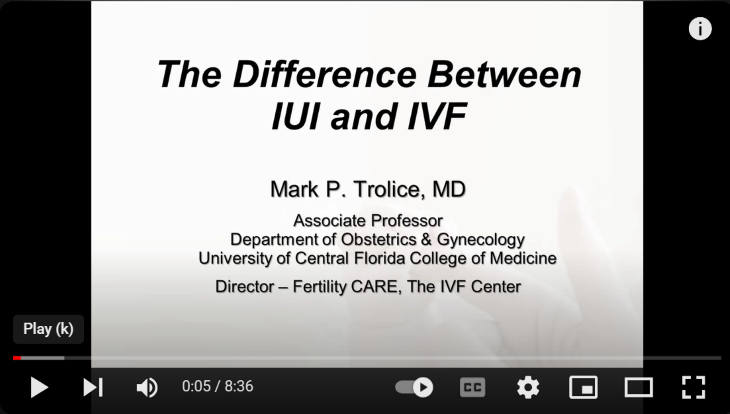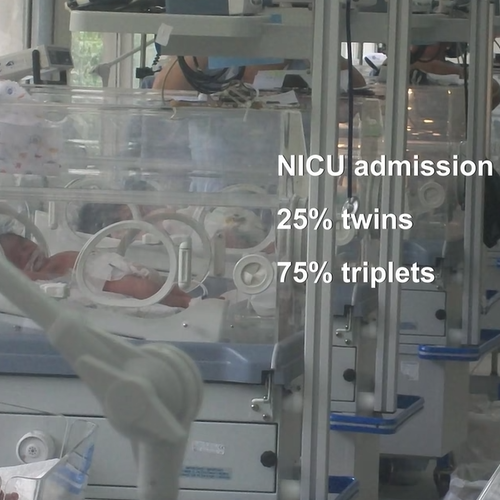
The Difference Between IUI and IVF
It is important to know Intrauterine insemination (IUI) or In vitro fertilization (IVF) can both be successful at helping grow your family.
Transcript
It is important to know Intrauterine insemination (IUI) or In vitro fertilization (IVF) can both be successful at helping grow your family.
With more couples across the U.S. turning to the use of fertility treatments and assisted reproductive technologies, one of the most common questions patients ask their fertility specialist is: what is the difference between IUI and IVF?
The answer isn’t always clear and depends on several unique factors. It is important to know Intrauterine insemination (IUI) or In vitro fertilization (IVF) can both be successful at helping grow your family.
Intrauterine Insemination (IUI)
Many couples choose to begin with intrauterine insemination (IUI) because of its significantly lower cost when compared to IVF. IUI typically runs anywhere from a few hundred dollars up to $2,000 per cycle, based on the fertility clinic, the type of medication used, the blood work, and follow-up that’s required.
However, IUI is considerably less effective than IVF, and couples may require multiple cycles before being able to conceive, bringing the overall expenditure closer to half the cost of IVF. In the U.S., the average cost of IVF is around $11,000 to $12,000, but again, IVF has considerably higher success rates than IUI.
What is IUI?
IUI is a simple office procedure that places sperm, collected from the partner and processed in the laboratory, into the uterine cavity. The "washing" of sperm in the lab removes seminal fluid (which can cause severe cramping) and concentrates the sperm. Placing the sperm higher into the uterine cavity bypasses the cervix and makes the passage to the fallopian tubes much shorter. The goal is to increase the chance that more sperm will encounter the egg.
IUI may be performed during a woman's natural ovulation which can be timed with over-the-counter ovulation predictor kits (OPK) or in conjunction with fertility medication received by the woman to assist in ovulation function
Who Can Benefit from IUI?
IUI can help couples when:
- A woman has ovulation problems and has not been able to conceive using ovulation-inducing fertility medication
- Fertility medication is used to increase the number of eggs a woman normally ovulates
- There are minor abnormalities in the sperm analysis (such as concentration, motility, and morphology or shapes of the sperm)
- Male partner has difficulty ejaculating
- The male partner has frozen sperm obtained prior to surgery or treatment for diseases like testicular cancer
- Donor’s sperm is being used to get pregnant
IUI is often considered as the first line of treatment for unexplained infertility, mild endometriosis, or mild male factor infertility.
In Vitro Fertilization (IVF)
What is IVF?
- A form of ART (assisted reproductive technology) in which a man’s sperm and a woman’s eggs are combined outside of the body in a laboratory dish
- A woman receives medications to stimulate her ovaries to develop multiple follicles with eggs
- A minor procedure under sedation uses transvaginal ultrasound to aspirate the follicles and obtain the eggs followed by same day sperm insemination
- Monitoring embryo growth to determine the optimal day & embryo(s) for transfer
Who Might Benefit from IVF?
In vitro fertilization is typically recommended for couples who have been trying unsuccessfully to get pregnant for one year and who display one or more fertility problems, such as:
- Blocked fallopian tubes from scarring or tubal ligation
- Lack of ovulation
- Extremely low male sperm count or low motility
- Advanced endometriosis
- Male partner with a history of a vasectomy
- Diminished egg supply and poor egg vitality
- Egg donation and/or IVF surrogacy
IVF is generally recommended for couples that have failed to conceive after three unsuccessful IUI cycles. According to the Society for Assisted Reproductive Technology, the IVF success rate in the U.S. for women of all ages is around 30 percent; however, when women under the age of 35 are taken into account, the IVF success rate are much greater.
Your Next Steps
Consulting a board-certified infertility specialist is an important first step in evaluating your unique fertility situation and determining the best course of action; Researching a clinic's success rates before committing to treatment can also help you in your decision-making process; And, contacting your insurance provide to determine your fertility coverage.
Videos
Resources For You

Advocacy Resources
ASRM has prepared resources to help you explain and advocate for reproductive rights and the continuation of in vitro fertilization and other fertility treatments.

Frequently Asked Questions
ASRM's Frequently Asked Questions (FAQ) provides answers to common questions about reproductive health.

Patient Journeys
ASRM has resources and publications to help you through each stage of your journey.

State and Territory Infertility Insurance Laws
One way that ASRM works to improve access to fertility care is by advocating for insurance coverage for reproductive medicine care. All patients should have access to the care they need.

Fact Sheets and Infographics
ASRM produces a series of fact sheets and booklets on various topics related to infertility, reproductive health, and family planning. The fact sheets and booklets are available in English, Spanish, and Chinese.

Reproductive Rights and You
The Dobbs decision has sparked a litany of changes in state laws across the nation, and more are expected. We need your help!

Reproductive Topics
Find all the resources on a specific topic compiled onto a single page.

SART Fertility Experts Podcast
An educational project of ASRM's affiliated society, the Society for Assisted Reproductive Technology (SART), this series is designed to provide up to date information about a variety of topics related to fertility testing and treatment such as IVF.

Patient Education Videos
ASRM and its affiliated society SART have made several videos to explain the sometimes difficult topics related to reproductive medicine.

Terms and Definitions
Find explanations for the meaning behind the doctor-speak you hear when trying to research reproductive medicine topics. ASRM has defined the most popular terms in easy to understand language.

Patient Stories
Read real-life stories from patients who have faced reproductive medicine challenges and come out stronger on the other side.

Fertility in the News
ASRM Press Releases and Bulletins are published by ASRM's Office of Public Affairs to inform the world about important happenings in reproductive medicine and at ASRM.
Intrauterine Insemination (IUI)
Side effects of injectable fertility drugs (gonadotropins)
Gonadotropins are fertility medications given by injection that contain follicle-stimulating hormone (FSH) alone or combined with luteinizing hormone (LH). View the fact sheetIntrauterine insemination (IUI)
When a woman conceives naturally, sperm travel from the vagina through the cervix, into the uterus, and up into one of the fallopian tubes. View the fact sheetIntrauterine Insemination (IUI) Infographics
ASRM has prepared infographics to illustrate the subject of Intrauterine Insemination (IUI) better. View the infographicsIn Vitro Fertilization (IVF)
SART Fertility Experts - Technology in ART & IVF
Explore the latest IVF technologies, from AI for embryo selection to vitrification, balancing innovation with compassionate patient care in fertility treatment. Listen to the EpisodeFertility & Sterility Publishes New Study Validating IVF Data Accuracy of a National Commercial Claims Database, Comparable with National IVF Registries
New study validates IVF data from commercial claims database, supporting its use by policymakers, employers, and researchers in expanding IVF coverage.
ASRM Statement on Palm Springs Bombing
ASRM condemns the Palm Springs bombing, stands with victims, and urges action to protect healthcare providers from violence and harassment.
ASRM Center for Policy & Leadership Releases Fact Sheet on Misleading Terminology, “Restorative Reproductive Medicine” and "Ethical IVF"
ASRM exposes how terms like “RRM” and “ethical IVF” mislead and restrict IVF access, urging science-based policies that support all paths to family building.
Just the Facts: “Restorative Reproductive Medicine” and “Ethical IVF” are Misleading Terms That Threaten Access
Terms like “restorative reproductive medicine” and “ethical IVF” mislead and restrict access to proven fertility care like IVF. Evidence must guide policy. View the advocacy resourceUS IVF usage increases in 2023, leads to over 95,000 babies born
SART releases 2023 IVF data during National Infertility Awareness Week, showing record births and rising demand for ART to support growing families.
SART Fertility Experts - Surgery Before IVF Egg Retrieval and/or Embryo Transfer
Expert insights on surgery before IVF, egg retrieval, and embryo transfer. Learn how procedures like fibroid removal and tubal surgery impact fertility success. Listen to the EpisodeASRM Center for Policy & Leadership Releases Fact Sheet on Safety of IVF for Pregnant People and Babies
ASRM's fact sheet confirms IVF as a safe, effective, regulated medical procedure, emphasizing careful monitoring of pregnancies for optimal health outcomes.
ASRM Center for Policy & Leadership Releases White Paper Detailing Oversight of IVF in the U.S. and Abroad
ASRM's Center for Policy & Leadership releases a white paper on IVF and ART oversight, detailing U.S. and global regulations and their impact on reproductive care.
SART Fertility Experts - Egg Retrieval: What is it REALLY like?
Learn about egg retrieval, preparation, procedure, recovery, and risks with fertility experts Dr. Susan Nasab and Dr. Dan Williams on the SART Fertility Experts Podcast. Listen to the EpisodeASRM Releases Statement on IVF Policy Priorities
ASRM advocates for expanded IVF access, urging policy solutions that prioritize patient care, inclusivity, and medical decision-making free from political interference.
ASRM responds to Trump Executive Order on IVF
ASRM welcomes Trump’s Executive Order on IVF, urging mandated insurance coverage and federal employee access to fertility care.
SART Fertility Experts - PGT-A and Mosaicism
Explore PGT-A, a genetic screening test for embryos, discussing its role in IVF, accuracy, candidates, mosaicism, and the future of fertility treatments. Listen to the EpisodeSART Fertility Experts - Vanquishing Multiples
Learn how a variety of factors such as geography, race, and the availability of comprehensive infertility mandates affect access to effective infertility treatment. Listen to the EpisodeAdvocacy in Action
Join the ASRM Advocacy in Action campaign by making a tax-deductible charitable gift Be part of Advocacy in ActionSART Fertility Experts - Global Access to IVF and the Status of Women
Around the world, there are vast differences in the number of IVF cycles performed per capita. Learn why these differences exist. Listen to the EpisodeSART Fertility Experts - Recurrent Pregnancy Loss and Implantation Failure
"I can get pregnant, but I can't stay pregnant," is echoed by patients with recurrent pregnancy loss. Listen to the EpisodeSART Fertility Experts - Navigating IVF as a Couple
Mary Casey Jacob, PhD is interviewed by Dr. Daniel Grow, and together they explore the emotional and practical support that couples need. Listen to the EpisodeFertility Rights and Responsibilities
Can a fertility program or clinic deny treatment to patient(s) if there is concern about the ability to care for the child(ren)? Yes. Fertility programs can withhold services if there are signs that patients will not be able to care for child(ren). View this Fact SheetProgesterone supplementation during IVF
Progesterone is a hormone produced by the ovary. View the fact sheetSide effects of injectable fertility drugs (gonadotropins)
Gonadotropins are fertility medications given by injection that contain follicle-stimulating hormone (FSH) alone or combined with luteinizing hormone (LH). View the fact sheetWhat do I need to know about conceiving after surgery on my Fallopian tubes?
Fallopian tubes connect the ovary (where the eggs are stored and grow) to the uterus (womb), where the fertilized egg develops into a baby (fetus). View the fact sheetHydrosalpinx
The fallopian tubes are attached to the uterus (womb) on the left and right sides. View the Fact SheetIn vitro fertilization (IVF): what are the risks?
IVF is a method of assisted reproduction in which a man’s sperm and a woman’s eggs are combined outside of the body in a laboratory dish. View the fact sheetWhat is In Vitro Maturation (IVM)?
In vitro maturation (IVM) is when a woman’s eggs are collected and matured outside the body. This is done as part of an in vitro fertilization (IVF) procedure. View the fact sheetSART Fertility Experts - Recurrent Pregnancy Loss
Candace discusses her experience with infertility, IVF, multiple pregnancy losses and ultimately a successful delivery with Dr. Julia Woodward.Listen to the Episode
SART Fertility Experts - Infertility Advocacy and Government Affairs
In today's episode, Dr. Mark Trolice interviews Sean Tipton about the fact that many infertility patients do not have insurance coverage for treatment. Listen to the EpisodeSART Fertility Experts - Behind the Scenes in the IVF Lab
Dr. Sangita Jindal, helps patients understand the importance of the IVF lab when choosing an IVF program. Listen to the EpisodeSART Fertility Experts - Your Infertility Nurse: Partner in Your Care
Infertility nurse practitioner and health coach Monica Moore explains the essential role of the infertility nurse in the IVF process. Listen to the EpisodeSART Fertility Experts - Genetics and IVF
Genetics is a significant part of advanced reproductive technology screening. Listen to the EpisodeIntracytoplasmic sperm injection (ICSI)
A procedure called intracytoplasmic sperm injection (ICSI) can be done along with in vitro fertilization (IVF) if a sperm cannot penetrate the outer layer of an egg. Read the Fact SheetSART Fertility Experts - Fertility and LGBTQ
In this episode, Dr. Daniel Grow interviews Dr. Mark Leondires, the founder of Gay Parents To Be. Listen to the EpisodeSART Fertility Experts - What is an REI?
These experts in infertility lead IVF programs, perform reproductive surgery, and perform research to enhance the field of reproductive medicine. Listen to the EpisodeSART Fertility Experts - What is IVF?
In this episode, we discuss the ins-and-outs of in vitro fertilization (IVF). Listen to the EpisodeStart with SART
The very first thing you should do when evaluating a clinic is verify that it is a member of SART. Watch VideoPreparing for In Vitro Fertilization (IVF): Lifestyle Factors
This SART micro-video discusses lifestyle factors that may affect in vitro fertilization, or IVF, outcomes. Watch VideoAssisted Reproductive Technologies (booklet)
This booklet will help you understand in vitro fertilization (IVF) and other assisted reproductive technology (ART) that have become accepted medical treatments for infertility. View the BookletThe Difference Between IUI and IVF
It is important to know Intrauterine insemination (IUI) or In vitro fertilization (IVF) can both be successful at helping grow your family. Watch VideoUnderstanding the SART Clinic Report
During this video we will discuss the SART Clinic Report concepts and demonstrate some of the report features. Watch VideoInfertility: an Overview (booklet)
Infertility is typically defined as the inability to achieve pregnancy after one year of unprotected intercourse. View the bookletKristen Ritchie's Story
I spent seven years navigating infertility, which was tumultuous but also a period of tremendous personal growth in hindsight. Read the storyIn Vitro Fertilization Infographics
ASRM has prepared infographics to illustrate the subject of in vitro fertilization (IVF) better. View the infographicsSART FAQ About IVF
Created by the Society for Assisted Reproductive Technology (SART) the following are answers to frequently asked questions concerning in vitro fertilization (IVF). Learn the factsIt takes more than one
Why IVF patients often need multiple embryos to have a baby View the advocacy resourceWhat support for IVF looks like
Bipartisan support for IVF, that is responsible for the birth of over 2% of all babies born in the USA each year, will ensure that families continue to grow. View the advocacy resourceJust the Facts: IVF Policy Priorities
ASRM advocates for expanded IVF access, urging policy solutions that prioritize patient care, inclusivity, and medical decision-making free from political interference. View the advocacy resourceJust the Facts: The Safety of In Vitro Fertilization (IVF)
IVF is a safe, proven medical procedure with extensive research backing. Though risks exist, advancements and strict monitoring ensure most IVF babies are healthy. View the advocacy resourceOversight of IVF in the US
In the US, medical care is regulated by a complex and comprehensive network of federal and state regulations and professional oversight. View the advocacy resourceFind a Health Professional






















